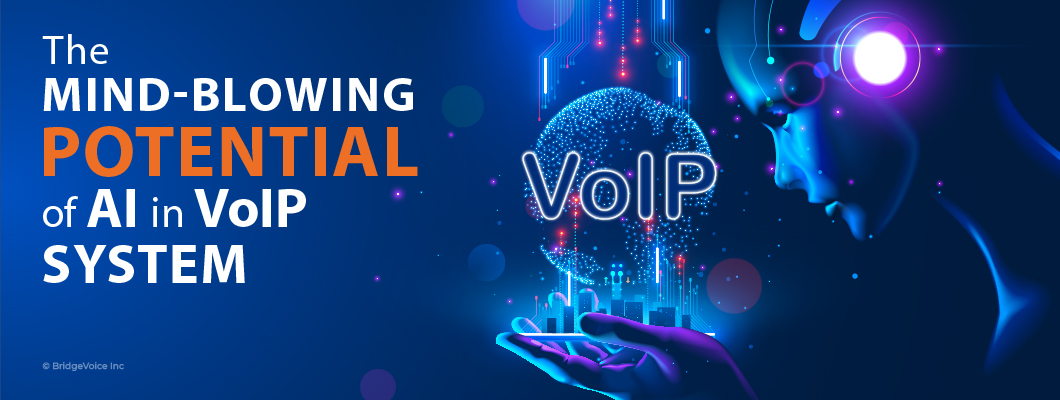The Mind-blowing Potential of AI in VoIP Systems

Artificial Intelligence and Machine Learning have earned a permanent seat in the telecom industry, especially in the segments concerning rich, unified, automated, and hyper-personalized conversations. Wholesale VoIP providers belong to one such domain, offering intelligent conversations to improve the quality of customer experiences, reduce churn, and increase customer satisfaction levels.
Wholesale voice carriers are already leveraging AI and network data sources to conduct predictive routing, analytics, fraud mitigation, virtual assistance, etc. Similarly, integrating AI, ML, deep learning, and Natural Language Processing (NLP) with VoIP systems promises to make callers’ lives easier.
According to a study, communication channels supported by artificial intelligence will handle 95% of customer interactions by 2025. The potential of AI in VoIP systems cannot be ignored, as its valuable insights enhance conversations by multitudes. Let’s look at the powerful capabilities AI brings to VoIP and its tangible impact on telecommunications.
5 Powerful Capabilities that AI Brings to VoIP
Pre-conversation Data Retrieval
Wholesale VoIP providers are increasingly moving toward an omnichannel model for providing services and products. AI-driven VoIP enables businesses to retrieve caller data, such as location, identity, intent, and call history, from various sources before the conversation begins. In addition, voice AI can help the VoIP system discover the call's intent and context.
After pulling out the query's meaning, context, and importance, the interactive voice response (IVR) system can funnel callers to the proper channels. Besides, predictive machine learning models can recommend the following best action based on past conversations with agents.
Independent Ticket Resolution
AI, along with NLP and Automatic Speech Recognition (ASR), can perform a sentimental analysis that involves the assessment of tone, emotion, and urgency. It converts unstructured natural language information into comprehensible data points.
It equips the virtual assistant to resolve the query before handing off the call to an available agent. These virtual assistants can serve the users round-the-clock, leading to reduced waiting times, satisfied customers, and fewer ticket backlogs.
Predictive Analytics
Businesses can apply predictive analytics to human-to-human interactions over VoIP connections. A programmable voice AI can give deeper insights into customer behavior that further predict purchasing decisions, future engagement with the company, and other communication patterns.
Besides, machine learning models can intervene to drive on-screen insights and suggestions from real-time audio to help agents improve the conversation. The system then can take care of the task where humans don’t need to be involved. For example, the system sends the customer a feedback or refund form based on the conversation.
Real-time Assistance for Agents
Users don’t like to recount their queries or details repeatedly. Here, AI keeps all real-time information fresh and relays it on the agent’s screen. AI structures data collected from CRM integration, relevant data from a ticket, and past conversations into a unified customer profile before the call is routed to the agent.
AI-first VoIP system keeps the agent in the loop with all the crucial user data points during the call. As a result, it reduces the Average Handling Time (AHT) since the agent doesn’t need to hop over multiple apps to scavenge for information. Canned responses, real-time translation, and next-best-action are other examples of real-time assistance.
Processing Call Data with ML
Wholesale voice carriers are using conversation intelligence on VoIP data continually. That way, AI keeps learning more about customers, their moods, sentiments, intents, issues while interacting with a virtual agent, and the top reasons users are contacting you.
Other insights, like success rates and Key Performance Indicators (KPIs), can serve a more critical strategic purpose, which conventional VoIP systems cannot do. For example, a business can know customers' varying sentiments for different product lineups through VoIP call data processing.
The Impact of AI-powered VoIP
Moving Beyond Self-service
AI-powered self-service provides telecom operators and businesses with the agility and quickness that users demand. AI-based VoIP solutions integrated into customer experience management platforms can automatically troubleshoot and resolve issues reported by customers.
Besides, AI will enable self-service systems designed to identify customer issues from chunks of information gained from customer journeys. It empowers customers with quick query resolution, no waiting time, accurate product tracking, etc.
Rich and Personalized Conversations
VoIP systems are paving the path for hyper-personalized customer experience through Natural Language Understanding (NLU) which brings special offers to the table by turning language into structured information.
AI and analytics solutions can gather information from customer journey mapping tools to trigger automated and personalized VoIP calls. For example, a virtual assistant can be programmed to call a field technician when broadband speed falls below a particular benchmark.
Cost Savings
Wholesale VoIP providers and other telecom companies incur high operational costs while maintaining infrastructure with increasing user expectations. AI makes the VoIP ecosystem agile and supports meeting demands with innovations.
AI can resolve most incoming tickets, allowing agents to accommodate more pressing issues and be productive. It leads to higher profits and lower losses by reducing the time and resources needed to keep customer support teams efficient.
Stay ahead of the Curve in the Era of Rich Communication Services
Many companies are discovering the potential of VoIP systems when integrated with AI and ML. AI-powered VoIP systems can go beyond delivering calls over wholesale voice carriers. AI can bring powerful capabilities to VoIP systems that benefit businesses and their customers. With the pace at which enterprises are turning to Rich Communication Services (RCS) and Unified Communications-as-a-Service (UCaaS) platforms, AI’s role will increase in supporting automated, personalized, and efficient handling of calls.
BridgeVoice’s cloud and AI-powered VoIP platform allow wholesale VoIP providers and carriers to manage all VoIP offerings, from virtual numbers to high-end wholesale voice termination services.

 Fostering Authentic Connections: The Power of P2P SMS-Enabled Numbers and DID Services in Customer Engagement
Fostering Authentic Connections: The Power of P2P SMS-Enabled Numbers and DID Services in Customer Engagement